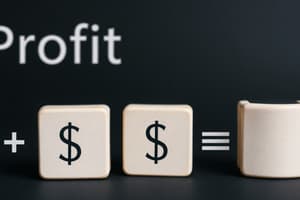Podcast
Questions and Answers
Volume hurdles are the final word in pricing decisions.
Volume hurdles are the final word in pricing decisions.
False (B)
Inelastic markets tend to favor price increases to improve profitability.
Inelastic markets tend to favor price increases to improve profitability.
True (A)
When the prices on all brands in the category increase, customers switch brands to a lower-cost alternative.
When the prices on all brands in the category increase, customers switch brands to a lower-cost alternative.
False (B)
Brand-level elasticity of demand is typically lower than industry-level elasticity of demand.
Brand-level elasticity of demand is typically lower than industry-level elasticity of demand.
Raising prices to cover fixed costs is justified from a profit maximization viewpoint.
Raising prices to cover fixed costs is justified from a profit maximization viewpoint.
If the expected increase in volume due to a price reduction overcomes the volume hurdle, the price reduction is predicted to harm profitability.
If the expected increase in volume due to a price reduction overcomes the volume hurdle, the price reduction is predicted to harm profitability.
Profit Sensitivity Analysis focuses on the impact of a large change in price on profits.
Profit Sensitivity Analysis focuses on the impact of a large change in price on profits.
Volume Hurdles refer to the demand increase needed to justify a price cut and the demand sacrifice to justify a price hike.
Volume Hurdles refer to the demand increase needed to justify a price cut and the demand sacrifice to justify a price hike.
Economic Price Optimization aims to identify the price that minimizes profits.
Economic Price Optimization aims to identify the price that minimizes profits.
In normal markets, for normal goods, a price increase is positively correlated with a volume increase.
In normal markets, for normal goods, a price increase is positively correlated with a volume increase.
If the volume hurdle is less than the expected change in sales, then the new price can always be justified.
If the volume hurdle is less than the expected change in sales, then the new price can always be justified.
Profit Sensitivity formula includes variables such as quantity sold, variable costs, and fixed costs.
Profit Sensitivity formula includes variables such as quantity sold, variable costs, and fixed costs.
Flashcards are hidden until you start studying
Study Notes
Profit Sensitivity Analysis
- Demonstrates the impact of a small change in price on profits
- Uncovers volume hurdles, which are the required demand increase to justify a price cut and the allowable demand sacrifice to justify a price hike
Volume Hurdles
- Used to quantify the required selling goals and compare them against the expectations of potential demand
- Calculated using the formula: 𝛑𝙛 ≥ 𝛑𝐢 %∆ 𝑄
- Depends on the size of the CM (contribution margin) and the percentage change in price
- If the volume hurdle is greater than the expected change in sales, the new price cannot be justified
Decision Implication of Volume Hurdles
- If the expected increase in volume associated with a price reduction overcomes the volume hurdle, the price reduction is predicted to improve profitability
- If not, the price reduction is predicted to harm profitability
Elasticity of Demand
- A measure of the changes in volume delivered with a change in price
- Can be used to predict the expected volume change resulting from a price change
- Markets can be classified as elastic or inelastic based on the elasticity of demand
Elastic Markets
- A small change in price has a large effect on the quantity sold
- Tend to favor price cuts to improve profitability
- High elasticity of demand implies that a small price cut delivers a large volume increase to overcome the volume hurdle
Inelastic Markets
- A large change in price has only a small effect on the quantity sold
- Tend to favor price increases to improve profitability
- Small elasticity of demand implies that a large price increase can be expected to yield negligibly small reductions in volume
Firm-Level vs. Category-Level Elasticity of Demand
- Firm-level elasticity of demand is typically higher than category-level elasticity of demand
- This is because customers readily switch brands to a lower-cost alternative when the price of an individual brand increases
- Category-level switching is more difficult than brand-level switching, resulting in lower elasticity of demand at the category level
Studying That Suits You
Use AI to generate personalized quizzes and flashcards to suit your learning preferences.




